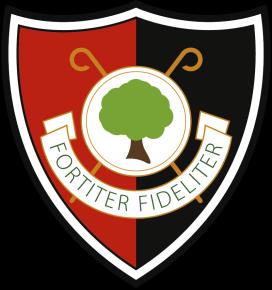




Academic success is at the forefront of our curriculum design, teaching and learning strategies, and pastoral care
Oxted Sixth Form is a selective Post-16 school of academic excellence. Students are encouraged to succeed academically so that they can go on with confidence to academia, apprenticeships, entrepreneurship, and employment. We are proud to say that Ofsted has recognised the achievements of our Sixth Form students in every regard.
We believe that learning in a classroom is only one aspect of a student’s time at Oxted’s Sixth Form. Students are expected to independently study for five hours per subject per fortnight, enhancing their in-class knowledge. They’re encouraged to take on roles of responsibility such as in the Junior Leadership Team (JLT) and with the thriving House system, develop wider reading, analytical, and revision skills, and act as a role model within the school community. As a function of being part of this flourishing, healthy school community, students enjoy their time at Oxted. Our Sixth Form Team is committed to working collaboratively with students and their families to signpost support and opportunities to prepare our pupils for the world beyond school. To us, this means both academic preparation, securing the highest grades possible and the acquisition and development of critical life skills such as independence, cooperation, and resilience.
We do hope you choose to study, learn, and develop at Oxted Sixth Form. We look forward to welcoming you.
Ms A Bergamo, Director of Sixth Form
The current Sixth Form Course Guide offers 36 courses at Level 3, consisting of 28 A-level courses and 7 vocational BTEC courses and the Extended Project Qualification (EPQ). In Year 12, students study three Level 3 subjects, which may combine A–levels and one vocational BTEC subject. Students may study for four subjects if they wish but only after consultation with the Sixth Form Team. Moreover, the expectation would be that the student will maintain a four A-level / BTEC Level 3 program of study over their entire two years in the Sixth Form.
It is our expectation that all students beginning a course in September 2024 plan to study the full two year programme and therefore students will not be entered for AS examinations at the end of Year 12.
Year 12 students have the option to undertake the EPQ alongside their programme of Level 3 subjects which is worth 50% of an A-level.
Admission to the Sixth Form is predicated on the principle that it is possible to offer each student courses that are most appropriate for them and offer the greatest chance of success, progression, fulfilment and enjoyment. Every year we welcome many students who have previously studied at other schools.
The general entry requirement for study in the Sixth Form is:
• At least 5 GCSEs at Grade 4 or above
• Minimum of Grade 4 in English Language or Literature and Grade 4 in Mathematics
In the event of a grade 4 not being achieved in English or Mathematics, the application will be reviewed and enrolment cannot be guaranteed. Individual subjects may include their own subject specific requirements above the general entry requirement and these are available in the subject section of the Sixth Form Course Guide 2025. The Sixth Form Team will advise and guide students through this process and provide any support that they may need to make appropriate choices. Individual circumstances may be considered by the Sixth Form Team when finalising enrolment decisions.
We will accept students who achieve a grade 3 in Mathematics or English on an individual basis looking at the subjects they want to study and meeting the average GCSE grade 4 requirement. These students will then take English or Mathematics GCSE retake classes on top of their 3 Level 3 choices.
Every effort is made to maximise the number of option choices available to the students. However, the final list of subjects running is dependent on student demand to ensure all courses are viable. Moreover, the positioning of subjects in blocks for timetabling is designed to suit the requirements of the majority of our students. Given these two factors, it might not be possible for every student’s subject requests to be met and therefore it may not be possible to run all courses offered in this course guide. When this is the case, we will notify the student as early as possible in the application process and provide support in the selection of another option choice. It should be noted the final composition of the option blocks will not be finalised until the summer term 2025.
As members of Oxted School Sixth Form, students are invited to contribute to the life of the School community, be beacons for behaviour, and act as role models to younger students. Involvement in activities will contribute to students’ personal development (through leadership, communication and organisational skills) and should be an enjoyable and rewarding way of enriching their Sixth Form experience. It will set them apart from other applicants for jobs, apprenticeships, gap year activities or universities.
Listed below are some of the ways that students can become involved through House or other school-based activities.
Activity
Junior Leadership Team
House Captains
Student Ambassador
Paired Reading
Duke of Edinburgh’s Award
Subject Captains
Inter-House Sport
Sport Enrichment
Sixth Form Charity Events
Year 7 Drama
Extended Project
Description
Elected at the end of Year 12 by staff and students. The JLT help organise social and charity events. They represent the school and community on a variety of occasions. They implement change and are a voice between the students and staff Senior Leadership Team
Voluntary House Duty Team supporting Head of Pastoral Teams and House Captains, particularly at whole school events
Trained peer counselling for younger students see Mr Edwards
Help younger students who have difficulty reading - see Mrs Waller
Students can work towards taking Bronze, Silver or Gold - see Mrs Tycer
Support a department through involvement in lessons with younger students, or through coaching, helping run clubs, teams etc. Support with whole school events.
Help Head of Pastoral Team organise teams or represent the House in senior competitions
Every Wednesday, take part in a range of sports and compete against other colleges
Students can organise and run charity events - see Mr Matthews
Students to help the Drama department - see Mrs Newman
This is an additional qualification whereby students complete a year-long project and have a mentor to help - see Mrs
A number of things will influence your choice of course:
• Personal preference
• Higher Education/Apprenticeship and career ambitions
• Course content
• Availability of courses
• Combination of courses
• Course entry requirements
To maximise the chances of choosing the right courses you should:
• Be aware of what your interests are: Sixth Form courses are academically demanding and it is essential that you are highly motivated in every subject you choose. Make sure you use Sixth Form Open Evening and the Course Guide to get fully informed
• Research what qualifications are required for any possible careers you have in mind; request a careers interview to discuss this with Mr Orozco through the Year 11 Team
• Find out as much as you can about the courses you might be interested in: look at the course descriptions in this course booklet, talk to teachers and parents, current Sixth Formers, your friends, your Tutor. Make sure you know what topics will be covered, how you will be taught and assessed
• Estimate your attainment in these subjects: comments on reports, at Progress Review Evening, coursework grades, predicted grades. Talk to your GCSE teachers and ask whether they think you would enjoy and cope with their subject at A-level and perhaps beyond. Be honest! If you are finding a subject very challenging at GCSE, consider whether it is the right choice at A-level
• Would you thrive on four? Virtually no university require or even prefer four A-levels and such a curriculum should not be undertaken lightly. If you are interested in taking four A-levels please discuss with one of the Sixth Form team to assess if this is your best choice. Further Maths students may benefit from taking four A-levels
• Combination of courses: consider how your subject choices complement one another as there can be an overlap of content. Depending on your post Sixth Form plans, this might be a benefit or a hindrance. Please seek advice if you are unsure.
Step
Internal students are required to apply for Sixth Form via SIMS Online by Friday 20 December. Students will be invited to register on SIMS Online which is where they will make their choices. Please see the power point which is in the ‘how to apply’ area on the school website.
Please select your subjects in order of preference along with a back up subject should you not get all of your other choices. There will be an opportunity to review and amend your choices following GCSE results. Application forms are available to download online. External applicants should send their application form by email to Katharine.LEstrange@oxted.thpt.org.uk
Internal Students: After handing in your application, all students will take part in a consultation to discuss choices with either the Sixth Form Team or a member of the School’s Senior Leadership Team. Internal applicants will also have the opportunity to take part in a ‘day in the life of a Sixth Form student’ and experience taster lessons as well as using the common room and silent study areas in a free period.
External Students: External students may also be required to attend an informal meeting and will be contacted accordingly. A reference will be requested from your current school.
This is a chance to experience a day as a Sixth Form student: you will have an opportunity to meet key staff and current Sixth Form students. You will also meet Sixth Form teachers in your choice of A-level taster lessons and ask them about the courses you have chosen.
Members of the Year 11 Team and Sixth Form Team, along with the Senior Leadership Team will be available to answer any immediate concerns or questions you may have as a result of your grades and guide you through your options.
This is your first day in September when you will find out information on the day to day life of a sixth form student. You will be allocated a tutor group, your course choices and timetable will be finalised prior to the start of A-level / BTEC Level 3 study.
Specific Course Entry Requirements

Meet General Entry Requirement

Examination Levels Offered
Applied Diploma Level 3 (equivalent to an A-Level)
Certificate (equivalent to an AS Level)

Exam Board
WJEC
Higher Education and Career Opportunities
It can lead to careers in the criminal justice systems, social work, probation work, police, psychology and other community based professions. It also enables access to universities as it is seen as the equivalent of one A-Level.
Criminology as a field of study is essential to many job roles within the Criminal Justice System, social and probation work and sociology and psychology. This course offers an opportunity to explore many areas of society and many employment and entrepreneurial opportunities in society. It offers an opportunity for students who are interested in social justice and other issues. It will help them develop an awareness of the overarching challenges facing society and some of the possible solutions and the role they can play in making society a better place for all.
The WJEC Level 3 Applied Diploma in Criminology is a wide-ranging qualification offering learning experiences in psychology, law and sociology that complements studies in humanities and the social sciences. This is an Applied General qualification. It is designed to offer exciting and interesting experiences that focus learning for 16–19-year-old students thorough applied learning, i.e., through the acquisition of knowledge and understanding in purposeful contexts linked to the criminal justice system. The qualification would support students moving from KS4 to KS5 with the aim of going onto further studies via an undergraduate or an apprenticeship.
The Diploma is equivalent to one A-level and comprises four units of equal weight, two of which are assessed through external exams, two of which through NEA. Alternatively, students can achieve a Certificate (equivalent to an AS qualification) by taking Units 1 and 2.

Staff Contact
Mr K Towl - ken.towl@oxted.thpt.org.uk
Specific Course Entry Requirements
Grade 5 in Art


Examination Levels Offered
A-Level
Exam Board AQA


Art and Design A-level is linear and will run as a two year A-level. In Year 12 students will develop a range of skills through workshops and investigations of contextual sources. They will start their personal investigation in March of year 12 which will be component 1 worth 60% of their final grade. In February of Year 13, they will then complete component 2; the externally set project worth 40%.
If you are interested in exploring the visual and tactile qualities of 3D, as well as 2D art, then this is the course for you. You will be encouraged to explore the work of other artists and designers and to develop responses. Your work will take the form of annotated boards and/or sketch books as well as 3D samples. You will also have the opportunity to further your creative interest in 2D or 3D form, or specialise in a Textile approach if you wish.
This course is perfect if you have a creative interest in design and are considering a design career, or if you have followed the GCSE Art & Design, Textiles, Fine Art, or even Photography.
Students will learn, develop and refine a variety of skills. They will complete three units of work using source material and relevant artists to create inspiring design work. A wide range of media and techniques will be explored, students will secure a sound knowledge of how to create and interpret contextual sources. Students will need to explain the development of their ideas through both written and visual information. Students will need to submit all of their research work and the final piece for the art exhibition. This will be the foundation for their A–level.
Higher Education and Career Opportunities
Degrees in Design, Fine Art, Fashion Design, Textile Design, Graphic Design, Architecture, Computer Design, Theatre Design, Product Design, Interior Design and Teaching. Careers such as artist, designer, architect, interior design er, creative roles in industry, fashion designer, fashion buyer, textile designer, product designer and graphic designer
This personal investigation incorporates both visual contextual and written elements. This will take the form of a portfolio of work. Students are encouraged to develop their own personal style and to develop a high level of skill within their chosen specialisms. Students must demonstrate greater maturity and depth in skill, knowledge and knowledge gained from Year 12. They are required to write an in depth essay to support their investigations. Staff will also advise and help to organise portfolio work for students who wish to apply for further education within the Arts.
This assignment is aimed at assessing the students’ ability to work independently in response to a chosen starting point carrying out investigation, developing ideas and realising intentions referencing contextual and critical sources Students will need to submit all of their research work and their final outcomes, which will be carried out over 15 hours in exam conditions.
Staff Contact
Ms N Garstang - natalie.garstang@oxted.thpt.org.uk

Specific Course Entry Requirements
Grade 5 in Art
Examination Levels Offered A-Level


Exam Board
AQA

Higher Education and Career Opportunities
Students can go on to study degrees in Fine Art, Fashion Design, Textile Design, Architecture, Theatre Design, Interior Design and Teaching. Fine Art can also lead to careers such as an artist, designer, architect, interior designer, creative roles in industry, art therapist, teacher or community art leader
A-Level Fine Art A-level is linear and will run as a two year A-level. In Year 12 students will develop a range of skills through workshops and investigations of contextual sources. They will start their personal investigation in March of Year 12 which will be component 1 worth 60% of their final grade. In February of Year 13, they will then complete component 2, the externally set project worth 40%.
You will study the skills of drawing and painting as well as visually expressing your ideas in a range of media. You will study contextual sources including a wide range of artists and use these to influence and develop your own personal investigation. If you enjoy working on thematic projects and exploring a range of art materials, this course is likely to appeal to you. You will also have the opportunity to study figure drawing. If you have followed the GCSE Drawing & Painting, Art and Design Art courses, this course is appropriate for you.
Students will learn, develop and refine a variety of recording skills and explore different media in the first term investigating a variety of artists as stimulus.
Students will develop their drawing and recording skills in including life drawing. Students will secure a sound knowledge of how to create and interpret contextual sources and this will help them develop their own personal style and portfolio.
Students will need to explain the development of their ideas through both written and visual information. Students will need to submit all of their research work and the final piece which will be presented in the art exhibition. This will be the foundation for their A-level.
Year 12 and Year 13:
Component 1: 60% worth of final grade
Personal investigation
This personal investigation incorporates both visual and written elements. This will take the form of a portfolio of work. Students are encouraged to develop their own personal style and to develop a high level of skill within their chosen specialisms. They are required to write an in depth essay to support their investigations. Students must demonstrate greater maturity and depth in skill and knowledge gained from Year 12. Staff will also advise and help to organise portfolio work for students who wish to apply for further education within the Arts.
Component 2: 40% worth of final grade
Externally Set Unit
This assignment is aimed at assessing the students’ ability to work independently in response to a chosen starting point carrying out investigation, developing ideas and realising intentions referencing contextual and critical sources Students will need to submit all of their research work and their final outcomes, which will be carried out over 15 hours in exam conditions.
Staff Contact Mrs K Sowerbutts – kirsty.sowerbutts@oxted.thpt.org.uk
General Entry Requirement
Grade 5 in an Art based subject


Examination Levels Offered
A-Level
Exam Board
AQA


Higher Education and Career Opportunities
Students can continue to study related Photography subjects at University. Typical career paths include: fashion photographer, special effects artist, news/editorial/fashion photographer, film director, and advertising designer
A-Level
Photography A-level is linear and will run as a two year A-level. In Year 12 students will learn a variety of photographic and contextual skills, including darkroom, Photoshop, alternative processes and digital editing. Students are encouraged to develop their own ideas into independent studies which will include studying photographers and artists to develop their own intentions. Students use a wide variety of Photographic media to realise photographic artworks. Students are expected to offset some of the expense of the course by contributing to materials and may have their own camera, preferably an SLR with a manual option.
Students learn to develop and refine a variety of photographic skills with reference to a variety of photographic image making techniques. After an initial unit studying Technical skills, students embark on their own project on a given theme which is the start of the Personal Investigation. At this point students, will develop ideas conceptually and creatively with reference to relevant artist and photographer studies to guide them. Various Photographic techniques such as Cyanotype, Wet processing, Photoshop, Photomontage and studio work are all explored to develop a final piece. Students record their learning and experiences in a sketchbook which must contain all experiments and written annotations.
A wide range of media and techniques will be explored: students will secure sound knowledge of how to interpret contextual sources. Students will need to explain the development of their ideas through both written and visual information, submitting all research and final piece for the art exhibition. This will be the foundation for their A–level.
Origins – a personal investigation incorporating both visual contextual and written elements. This will take the form of a portfolio of work. Students are encouraged to develop their own personal style and to develop a high level of skill within their chosen specialisms. Students must demonstrate greater maturity and depth in skill, knowledge and knowledge gained from Year 12. Staff will also advise and help to organise portfolio work for students who wish to apply for further education within the Arts.
This assignment is aimed at assessing the students’ ability to work independently in response to a chosen starting point carrying out investigation, developing ideas and realising intentions referencing contextual and critical sources Students will need to submit all of their research work and their final outcomes, which will be carried out over 15 hours in exam conditions.
Staff Contact
Mrs K Potter - kate.potter@oxted.thpt.org.uk
Specific Course Entry Requirements
Grade 4 in Art

Examination Levels Offered
A-Level


Exam Board AQA

This course is a direct link to the GCSE Art and Design Textiles that we offer at Oxted School. Through the course you will develop your skills in designing, both with hand drawing and computer design software. You will also develop skills in hand printing.
Students will complete projects on garments/fashion • accessories • soft furnishings • printed and/or dyed textiles • constructed textiles • textile installation • expressive textiles • digital textiles and develop skills in fabric printing, mono-printing, relief printing, screen printing, tie-dye, batik, spraying, transfer, fabric construction, stitching, appliqué, patchwork, padding, quilting, embroidery, weaving, knitting and mixed-media applications.
Across two years, students will complete two portfolios that will be put forward for submission to the exam board.
There are two distinct elements:
• a practical portfolio with supporting contextual research in response to a set theme. The portfolio may be presented in a format appropriate to the specialism and area of study chosen
• A related study using words and illustrations demonstrating the context in which their portfolio exists, exploring the relevant genre, subject matter, movement or historical framework of the selected theme.
Higher Education and Career Opportunities
This qualification supports progression into further education, training or employment, including any appropriate design-related courses. The course leads to a wide range of vocations including architecture, concept design, interior design, exhibition design, theatre sets and garden design
Students can choose a starting point from any of the seven given themes for which they will generate an appropriate personal response for assessment. They will carry out preparatory work to research, plan and develop their ideas, before engaging in 15 hours of supervised time to complete their work.
Staff Contact
Mrs K Sowerbutts - kirsty.sowerbutts@oxted.thpt.org.uk
Specific Course Entry Requirements
Combined Science minimum of 6-6 grade, minimum of 6 in Biology Separate Science, 5 in English and 6 in Maths

Expectations
Biology A-level is a rigorous academic subject and we strongly advise taking either another Science or Maths Statistics with this A-level to succeed in this course. Additional study will be required if you study Biology in isolation. Good literacy and language skills are required to succeed in this subject.

Examination Levels Offered
A-Level

Exam Board

Higher Education and Career Opportunities
Careers within Biology include research (particularly in genetics, medicine and biochemistry), conservation and environmental work. Careers in which you will find your knowledge of Biology useful include genetics, cosmetics, pharmaceuticals, environmental health, nursing and healthcare, water treatment, medicine and biotechnology industries
Biology A-level is linear. Assessment of a student’s knowledge and understanding of the whole course takes place at the end of two years study. Students will be expected to complete a formal end of year test at the end of Year 12.
Biology is one of the most dynamic fields of study in terms of the practical - stem cell therapy; the conceptual - the synthetic cell; and the future-memory augmentation surgery. Biology is the study of the natural world and all the living things in it, from the largest mammals down to our very own microscopic DNA. This course covers a variety of different areas of Biology including Human Physiology, Ecology, Biochemistry and Genetics. Each topic is presented using a real-world setting. If you want to explore the environment around you, the interactions of organisms inhabiting it and their structure, then this is the course for you.
• Paper 1 - 50% of the total qualification, 1 hour 30 minutes, 75 marks
• Paper 2 - 50% of the total qualification, 1 hour 30 minutes, 75 marks
• Paper 1 - 35% of the overall qualification, 2 hours, 91 marks
• Paper 2 - 35% of the overall qualification, 2 hours, 91 marks
• Paper 3 - 30% of the total qualification, 2 hours, 78 marks
Paper 3 contains an essay question in which students will have the choice of two titles from which to compose one essay. This will be 25 marks of the paper, equating to 32% of the grade for this paper. Throughout the course, students will also have to complete 12 Core practical experiments, which can be examined in any of the papers.
Further details of the topics covered in each unit and paper is available on our website: www.oxtedschool.org

• Topic 1: Biological molecules - From AS course
• Topic 2: Cells - From AS course
• Topic 5: Energy transfers in between organisms
• Topic 6: Response to Environment
Staff Contact Mrs A Driver - amber.driver@oxted.thpt.org.uk
• Topic 3: Organisms exchange substances within the environment - From AS course
• Topic 4: Genetics and Biodiversity - From AS course
• Topic 7: Genetics & Evolution
• Topic 8: Control of Gene Expression

General Entry Requirement
Meet General Entry Requirements
Examination Levels Offered
A-Level


Exam Board AQA

Higher Education and Career Opportunities
Students can study any business related topic at University such as marketing, accounting and business management. Business Studies also goes well with language courses. Career opportunities include Management trainee courses; and specific employment in marketing, finance, operations and Human Resources
A-Level
Business A-Level is linear. Assessment of a student’s knowledge and understanding of the whole course takes place at the end of two years. The linear course will encompass a more holistic approach to Business and will give students the chance to integrate their knowledge and understanding of different areas.
Business is a ’living’ subject and information is constantly being updated regarding business development, the economy and its impact on business, changes in government policy as well as global issues. You will cover a wide range of topics to reflect the nature of the subject which examines the key functions in any business.
We expect students of Business to be interested in current business events. This means students should read a quality newspaper and watch/listen the news on a weekly basis in order to be able to relate theory to actual business practice. This also means that the subject comes alive for them. At the end of Year 12 the student will be able to continue the subject on to the full
A-Level if a D grade or better is achieved in the Year 13 entrance exams.
Year 12 - Year One
Decision Making
• Unit 1 - What is business? Forms, Purpose, Environment
• Unit 2 - Leadership (Decision Making, and Stakeholders)
• Unit 3 - Marketing (Positioning and Stakeholders)
• Unit 4 - Operations (Systems and Quality)
• Unit 5 - Financial (Control and Analysis)
• Unit 6 - HR (Performance and Motivation)
Year 13 - Year Two
Strategies
• Unit 7 - Positioning (SWOT, External Influences)
• Unit 8 - Direction (Markets and Competition)
• Unit 9 - Implementation
• Unit 10 - Managing Change
Three exams at the end of the second year. Two hours each all worth 33.3% of marks.
Staff Contact
Mr T Edwards - tim.edwards@oxted.thpt.org.uk
Combined Science minimum of 6-6
Grade 6 in Maths

Chemistry contains many links to the other sciences and we strongly advise studying another Science in conjunction with Chemistry to aid understanding.
Chemistry A-Level contains a significant quantitative part and so we recommend also studying Maths A-Level in conjunction with Chemistry. Additional study will be required if you study Chemistry in isolation

Examination Levels Offered A-Level

Exam Board AQA

Studying Chemistry will provide you with a firm foundation for further studies in the subject and complements other courses, especially Biology, Physics, Mathematics and Geography. Chemistry A-Level is essential if you are considering a career in medicine, veterinary medicine, biological science or pharmacology
Chemistry A-Level is linear. Assessment of a student’s knowledge and understanding of the whole course takes place at the end of two years. Students will not be expected to complete an AS examination at the end of the first year, but will complete internal school exams.
Chemistry is a fascinating subject, combining theory and practical work to explain how the world around us works. Chemistry is a pivotal Science, vital for Medicine and Veterinary Science and a very good fit with both Biology and Physics, as well as many other subjects.
Prospects for students with a Chemistry A-Level are bright. Seen as a challenging subject by both Universities and employers, a Chemistry qualification shows you are able to understand and analyse complex ideas and apply them to unfamiliar situations. Of course, Chemistry is fun too; if it can be set alight, be caused to explode or give off foul gases, then it must be Chemistry!
Associated Course Costs
Text books for studying at home will need to be purchased; there is an online version provided by the school.
Year 12 - First Year Course Topics - you must pass this year with at least a grade D to continue the course.
• Module 1 - Physical Chemistry
• Module 2 - Inorganic Chemistry
Year 13 - Year Course Topics

• Module 5 - Physical Chemistry
• Module 6 - Inorganic Chemistry
• Module 3 - Organic Chemistry
• Module 7 - Organic Chemistry
Your final grade will be based on your performance in the final 3 papers at the end of Year 13.
• Paper 1 (Physical and inorganic Chemistry) assesses the content from modules 1, 2, 5 and 6
• Paper 2 (Physical and organic chemistry assesses the content from modules 1, 2, 3 and 7
• Paper 3 (Practical) assesses the content from modules 1 to 7
Papers 1 and 2 will last 2hrs and contribute 35% to the qualification, each containing a 15% multiple choice section. Paper 3 lasts 2 hours and contributes 30% to the qualification. Practical skills are assessed on a pass / fail basis, but this does not contribute to the grade and is reported separately.
Staff Contact Mrs S Picard - sade.picard@oxted.thpt.org.uk
A minimum grade 5 in GCSE Computer Science and a grade 5 in GCSE Mathematics is required


Examination Levels Offered
AS and A-Level
Exam Board

OCR “Everybody should learn how to code because it teaches you how to think” SteveJobs

Higher Education and Career Opportunities
This course is excellent for a student wishing to be a technical user or a programmer; an ideal stepping-stone to a Computing or Computer Science qualification at University. The course will develop logical thinking and planning skills and will equip students to be effective problem solvers. The deep understanding of computer systems and programming studied in Computer Science provides a valuable range of skills that are highly valued within many disciplines and careers, even those which do not initially appear to require programming directly
Oxted School has been designated as a Lead School in the Network of Teaching Excellence by the British Computing Society and the Department for Education in the Computing at Schools Network.
Computer Science is a practical subject where students can apply the academic principles learned in the classroom to real-world systems. It’s an intensely creative subject that combines invention and excitement, and can look at the natural world through a digital prism.
Course Content: The content of this A-Level in Computer Science (H446) is divided into three components:
Computer Systems Component (01) - 40% of qualification - This unit contains the majority of the content of the specification and is assessed in a written paper recalling knowledge and understanding. Component 01 covers the characteristics of contemporary systems architecture and other areas including the following:
• The characteristics of contemporary processors, input, output and storage devices
• Software and software development
• Programming
• Exchanging data
• Data types, data structures and algorithms
• Legal, moral, ethical and cultural issues
Algorithms and Programming Component (02) - 40% of qualification - This unit relates principally to problem solving skills needed by students to apply the knowledge and understanding encountered in Component 01. There’ll be a short scenario/ task contained in the paper, which could be an algorithm or a text page-based task, which will involve problem solving. Other areas covered include the following:
• Elements of computational thinking
• Problem solving and programming
• Algorithms
Programming Project Component (03 or 04) - 20% of qualification - This unit is a practical portfolio based assessment with a task that is chosen by the teacher or learner and is produced in an appropriate programming language. Mathematical skills and logical thinking are embedded throughout the content of the three components. They will be assessed in the written papers and through the non-examined assessment where appropriate.
Staff Contact
Mr N Towler - niall.towler@oxted.thpt.org.uk

Specific Course Entry Requirements
Grade 4 in Art & Design (D&T) and grade 4 in Maths

Examination Levels Offered
A-Level
Exam Board
EDUQAS - Design and Technology (Product Design) A602QS


Higher Education and Career Opportunities
This qualification supports progression into further education, training or employment, including any appropriate design-related courses. The course leads to a wide range of vocations including architecture, concept design, interior design, exhibition design, theatre sets and garden design
This creative and thought-provoking qualification gives students the practical skills, theoretical knowledge and confidence to succeed in a number of careers, especially those in the creative industries. They will investigate historical, social, cultural, environmental and economic influences on design and technology, whilst enjoying opportunities to put their learning in to practise by producing prototypes of their choice. Students will gain a real understanding of what it means to be a designer, alongside the knowledge and skills sought by higher education and employers.
• designing and innovation
• materials and components
• processes
• industrial and commercial practice
• product analysis and systems
• human responsibility
• public interaction
• marketing and research Assessment
Students sit one written exam at the end of Year 13, based on all the theory taught throughout the course. It is worth 50% of the course.
The remaining 50% of the course is a Non Examination Assessment (NEA) assessed in the form of a substantial design and make project. A written design portfolio and sketchbook, supported by photographic evidence of a final prototype is required based upon a context and design brief developed by the student:
a) Identifying and investigating design possibilities
b) Developing a design brief and specification
c) Generating and developing design ideas
d) Manufacturing a prototype
e) Analysing and evaluating design decisions and prototypes
Staff Contact
Ms D Sebe-Ankra - davinia.sebe-ankra@oxted.thpt.org.uk
Specific Course Entry Requirements

Grade 4 in Drama or equivalent practical experience of drama and theatre, plus Grade 5 for English

Examination Levels Offered
A-Level
Exam Board

AQA
Higher Education and Career Opportunities
Students can go on to higher education and study many subjects including Theatre, English, Speech Therapy and Creative Writing. Career opportunities include actor, presenter, community arts worker, teacher, drama therapist, arts administrator, and media researcher
At Oxted School, we offer a wide and exciting Drama course to inspire students. Over the duration of the course students will deepen their performance and design skills, as well as continuing to develop essential social and communication skills. There will be a higher level of analysis and evaluation of students own work and that of others. Our curriculum allows ample opportunities for students to work practically exploring the work of professional theatre makers such as Frantic Assembly and Gecko. Students will also be influenced by practitioners such as Brecht and Stanislavski, allowing students to discover a diverse range of styles and genres.
Students will study two contrasting set texts and answer questions working as performers, designers, and directors. They will also watch a live piece of theatre and write a detailed evaluation, analysing both performance and design.
Students will work as a performer or designer and create an original piece of theatre. Students have the freedom to choose their own stimuli to devise from, allowing full creativity and work that suits the style of the students. A written notebook details the process that students undertake and allows students to reflect and evaluate their work.
Students will work practically on three different play (different from those in Component 1) as either a performer or designer. One play will be performed to an external examiner and will be influenced by a leading practitioner. A portfolio details the work of all three plays and allows students to reflect and evaluate their work.

Staff Contact
Mrs L Newman - lucy.newman@oxted.thpt.org.uk
Specific Course Entry Requirements
Meet General Entry Requirements

Examination Levels Offered
AS and A-Level

Exam Board
AQA

Higher Education and Career Opportunities
Economics combines well with most other subjects for a range of university courses. These include Mathematics, Politics, Geography, English and History
Economics opens up a wide variety of careers and courses ,with Economics graduates highly sought after. In recent years, students have gone on to study or work in the fields of Accountancy, Banking, Brokering, Business Consultancy, Finance, Politics, Risk and Portfolio Management for international blue chip companies, government departments and independent entrepreneurs.
Economics is the study of choice and decision making in a world with limited resources - how answering society be organised to make the best of what little we have and what should governments do to achieve this. Economics is a subject looking at how and why events happen in the real world, with a focus on students often working independently to develop their views and opinions. To be successful, you need to have a business-like approach to your studies, attending lessons punctually and being motivated to organise your own work outside lessons. Most important of all, you need to ensure you read around the subject and have a good knowledge of current affairs.
Year 12 Microeconomics:
Introduction to markets and market failure - How firms make decisions about what to produce, how consumers decide what to buy, issues such as pollution and congestion, the National Health Service.
Year 12 Macroeconomics:
The UK Economy - The policies which are used to overcome problems such as unemployment, inflation.
Year 13 Microeconomics:
Business behaviour and the labour market - How firms decide upon how much to produce and what price to sell at, how different industry structures work, how the government intervenes in industry.
Year 13 Macroeconomics:

A Global Perspective - How countries trade with each other, policies governments use to manage the effects of international trade on their economy, How countries manage their economies in order to develop and improve living standards, whether globalisation is a blessing or a curse
Economics teaches you about how the real world, outside the classroom. You will also develop your analytic, numeric, communication and problem solving skills and cultural awareness. We expect Economics students to be interested in current economic events.
Assessment
Examinations for A-Level Economics are taken at the end of Year 13, and consist of three exams each worth 33.33% of the final mark:
• Paper 1 – 2 hours - Microeconomics (Markets and Market Failure)
• Paper 2 - 2 hours - Macroeconomics (National and International Economy)
• Paper 3 - 2 hours - Synoptic Case Study (Economic Principles and Issues)
Staff Contact
Ms K Hern - Kathryn.hern@oxted.thpt.org.uk
Specific Course Entry Requirements
Grade 6 in English Language

Examination Levels Offered A-level


Exam Board Eduqas

Higher Education and Career Opportunities
English Language is ideal for those wishing to take the subject further at University.
It is a very well-regarded subject benefitting all students, even those who wish to pursue other subjects at a higher level.
Achieving well in this subject illustrates excellent written expression, ideal for those interested in professions such as Law or Journalism. It also displays cultural and historical awareness; the ability to analyse and evaluate; and the ability to develop original ideas, qualities beneficial in pursuing any professional career, including Early Years Education, Publishing or Teaching.
English Language A-level is a fascinating subject which varies significantly from GCSE English Language. This course will be of interest if you:
• Enjoy writing creatively
• Like solving puzzles, analysing data and carrying out investigations
• Have ever wondered why some of the words and expressions your friends use are different from those you hear amongst your grandparents’ generation, and why some people from the North sound different from those in the South of England
• Have ever wondered how a child learns to speak
There is some reading involved, but we will not read complete works of fiction! Interest and motivation are more important than your grades at GCSE.
The examined units are as follows:
1. Analysing spoken language (10%)
2. Language issues: how children learn to talk; language and power; language and situation (20%)
3. Language change over time (20%)
4. How language is used in the twenty-first century (10%)
5. Writing two creative original texts, plus a commentary on what you write (20%)
The exams all take place at the end of Year 13.
There is also a non-examined unit (NEA/coursework) in which you will carry out an investigation into an area of your own choosing linked to language and identity or language and gender. This counts for 20% of the overall A-level.
Specific Course Entry Requirements
Grade 6 in English Literature

Examination Levels Offered
A-level


Exam Board
OCR

Higher Education and Career Opportunities
English Literature is ideal for those wishing to take the subject further at University. It is an extremely traditional, academic and well-regarded subject benefitting all students, even those who wish to pursue other subjects at a higher level.
Achieving well in this subject illustrates not only excellent written expression, ideal for those interested in professions such as Law or Journalism, but also varied cultural knowledge; the ability to analyse and evaluate; and the ability to develop original ideas, qualities beneficial in pursuing any professional career, including Publishing or Teaching
English Literature A-level is linear. Assessment of a student’s knowledge and understanding of the whole course takes place at the end of two years.
The OCR A-level in English Literature is a rigorous and challenging qualification which allows both freedom of textual choice and embedded independent study. The non-examination element allows more detailed work in a field of particular personal interest, preparing students well for further study.
The aim of this subject is to encourage students to develop their interest in and enjoyment of literature and to engage critically and creatively with a variety of texts and contexts.
There are three units in this A-level. We start Year 12 with Unit 2 - the second and longer examination paper. This is the ComparativeandContextualunit, worth 40% of A-level, and focuses on Prose in the gothic genre. We explore Bram Stoker’s ‘Dracula’, Angela Carter’s ‘The Bloody Chamber’, and a wide range of unseen extracts.
We then work towards the first piece of coursework, a 1,000 word essay on Contemporary Poetry for Unit 3, which makes up 20% of the overall A-level.
Alongside this, we study the Shakespeare component of Unit 1, Drama and Poetry.
In Year 13, we study a pre-1900 play - John Webster’s ‘The Duchess of Malfi’ and pre-1900 poetry - a selection by Christina Rossetti - for unit 1.
We will also be completing the final piece of coursework which is a 2,000 word essay with a focus on post-1900 literature. In this, you are able to - with the guidance and support of your teacher - select your own texts to analyse, thus helping you to explore texts and concepts that interest you, and prepare you more fully for university study.
Staff Contact Miss A Harman - Abigail.harman@oxted.thpt.org.uk
Combined Science minimum of 5-5 grade, or a 6 in any Separate Science subject, 5 in English and 5 in Maths

Examination Level Offered
A-Level

Exam Board
AQA

Expectations
Environmental Science A-level is a rigorous academic subject and we strongly advise taking either another Science, Geography or Maths with this A-level Additional study will be required if you study Environmental Science in isolation. Good literacy and language skills are required to succeed in this subject

Higher Education and Career Opportunities
Careers within Environmental Science Environmental Science include town and country planning, energy resource management, pollution engineering, medical science, geology, pollution management, waste management, ecology and conservation. Careers in which you will find your knowledge of Environmental Science useful include forensic science, medicine, engineering, architecture, health and safety
A-Level
Environmental Science is one of the most current and relevant fields of scientific study in today’s world.
This course covers a variety of different areas of science, developing the traditional topics studied in GCSE Biology, Chemistry and Physics, to explain how the Earth has developed over time, the impact of humans, plants and animals in different ecosystems. These ideas are considered in terms to current environmental issues and potential solutions to these. Each topic is has links to news, real world context and planning for the future. If you want to explore the history and issues relating to the environment around you, then this is the course for you.
• Paper 1 - 50% of the overall qualification, 3 hours, 120 marks
• Paper 2 - 50% of the overall qualification, 3 hours, 120 marks
• Topic 1: The Living Environment
• Topic 2: Biological Resources
• Topic 3: Sustainability
• Topic 4: Research Methods
• Topic 5: The Physical Environment
• Topic 6: Energy Resources
• Topic 7: Pollution
• Topic 8: Research Methods 2
Both papers are a combination of multiple choice, short answer and extended writing questions. Students will be expected to draw on knowledge and understanding of the entire course of study to show a deeper understanding of the interconnections between topics.
Further details of the topics covered in each unit and paper is available on our website: www.oxtedschool.org
Staff Contact
Mrs L Bond – lisa.bond@oxted.thpt.org.uk

Specific Course Entry Requirements
English Grade 5
Examination Levels Offered
A-Level grades A* to E


Exam Board
AQA

Higher Education and Career Opportunities
This qualification builds invaluable independent learning skills which are useful for any student as it supports the skills required in work, for apprenticeships and in higher education. The taught skills include planning and managing a project, research skills, referencing skills, essay writing as well as presenting skills.
In addition students deepen and extend their knowledge and understanding of any chosen area of interest.
The qualification provides students with an opportunity to delve into an area of genuine interest. There are clear guidelines concerning the appropriateness of research topic titles. As part of the qualification they receive taught timetabled input into effective research methods, referencing, planning and presenting although the main onus is placed on the student. This course builds a range of independent learning skills.
At Oxted School, all students are allocated a weekly timetabled supervision session with a teacher who will teach the taught skills element as well as guide and support the student through the process. The course is expected to take 90 hours, most of which are completed independently by the student.
Doing an EPQ can give you the opportunity to get a wider perspective on how your subjects ,or just any interest you have, fit into the wider world. Committing to learning on your own, outside of the classroom sets you up great for both university and just life itself.
Students can choose to research any topic of interest. They also choose whether to make an artefact (for example; model, film, piece of writing, code a computer programme, write a piece of music, make an architectural model etc.) or write an extended report or essay. The Examination Board has clear guidelines about setting an appropriate topic and title.
Students submit three elements which are assessed at school and moderated by the Examination Board.
The Process Log which describes in detail the learning journey undertaken. This starts with Initial Planning, setting aims and objectives, reflecting on progress, justifying decisions, planning research, planning the essay/report, planning the presentation and a final summary and reflection of the whole process. This is worth approximately 60% of the total marks.
The Report/Essay (5,000 words) or the Artefact plus Supporting Statement (1000 words). The report should be carefully planned and structured with all research sources clearly referenced. Students must submit a bibliography to evidence their resource base. This is worth approximately 40% of the total marks with the presentation.
The Presentation of 10 to 15 minutes plus a Question and Answer session. Students normally choose to deliver a PowerPoint (or similar) presentation to a small group of fellow EPQ students and their supervisors. Students also prepare a display board to act as a focal point for a discussion about their project, its successes and their main discoveries.
Staff Contact
Mrs H Harber - hilary.harber@oxted.thpt.org.uk

Specific Course Entry Requirements
Grade 5 in GCSE Food Preparation and Nutrition or a distinction in Catering and Hospitality BTEC. Average grade 4 in Science GCSE. Students do not need to have studied Food at GCSE

Examination Levels Offered
Level 3

Exam Board
WJEC

Higher Education and Career Opportunities
By studying for this certificate alongside other relevant qualifications at Level 3 e.g. GCE Biology, Physical Education, Sociology, students will gain the required knowledge to use the qualification to support entry to higher education
courses such as: BSc Human Nutrition; BSc (Hons) Public Health Nutrition:; BSc (Hons) Food Science and Technology.
This course can lead to careers in the Food industry Nutritionists, product development and food technologist or in business in marketing and sales or alternatively as a sports coach or fitness instructor
An understanding of food science and nutrition is relevant to many industries and job roles. Care providers and nutritionists in hospitals use this knowledge, as do sports coaches and fitness instructors. Hotels and restaurants, food manufacturers and government agencies also use this understanding to develop menus, food products and policies that that support healthy eating initiatives.
Knowledge of a food in terms of nutrition and practically, are the corner stones to enabling students and young people to develop the life skills of cooking healthy and balanced food dishes. Together with the development of food based scientific knowledge, students will be able to independently adapt recipes and understand how different ingredients function together in a recipe and in turn further their appreciation of the working characteristics of these in dishes. For example, why does bread go brown in a toaster? Why does broccoli go green-grey in colour if it is overcooked?
The WJEC Level 3 Certificate in Food Science and Nutrition has been designed to provide students with underpinning knowledge, understanding and skills to progress to further study and training. It offers exciting and interesting experiences that focus learning for 16-19 year-old students through the acquisition of knowledge and understanding in purposeful contexts linked to the food production industry.
The WJEC Level 3 Certificate in Food Science and Nutrition is assessed through a combination of a 1 ½ hour written exam and an internal centre marked assignment. This equates to 50% internally assess and 50% externally assessed work. Key topics that will be covered for the exam include the importance of food safety, properties in nutrients and the relationship between these and the human body and being able to plan nutritional requirements.
Students complete three units over two years of study. The mandatory unit on Meeting Nutrition Needs of Specific Groups, will enable the learner to demonstrate an understanding of the science of food safety, nutrition and nutritional needs in a wide range of contexts, and through on–going practical sessions, to gain practical skills to produce quality food items to meet the needs of individuals. Students will research, plan and cook high quality and well presented dishes for a specific dietary need in a safety and hygienic manner.
The qualification supports progression from GCSE Food Preparation and Nutrition and together with relevant Level 3 qualifications such as AS and A-Levels in Biology, Chemistry, Physical Education, Sociology and Maths. It will enable students to pursue careers or learning in related areas such as the food industry production.
Staff Contact Miss S Djemil - sevgin.djemil@oxted.thpt.org.uk

Specific Course Entry Requirements
Grade 6 in French
Examination Levels Offered
A-Level


Exam Board
Edexcel

Higher Education and Career Opportunities
Knowledge of a foreign language is increasingly considered to be an asset in a variety of careers. French can be studied as a main subject in a degree course but can also be combined with another subject such as Business, Law or Media Studies. Traditionally, language graduates enjoy very high levels of employment
If you like discussing contemporary issues and learning about the cultural background of other countries, you will certainly enjoy French A-level. By the end of the course, you should be able to communicate confidently and quite fluently in French.
The A-level French course is a two-year course, and will be examined at the end of Year 13. Throughout the course you will develop your independent language creation skills, developing a range of vocabulary and broadening your grammatical understanding and application.
In Year 12, you will develop your language skills from GCSE and will look specifically at the following topics:
• Changes in French Society: Family life, Education and the World of Work
• Artistic and Political culture in France: Music, Media and Festivals and traditions
In addition to this you will complete an in depth study of a modern French film.
In Year 13, you will build on the topics from Year 12, and will also study:
• Immigration and French Multicultural Society
• The Occupation of France 1940-1944 and the French Resistance
In addition to this you will complete an in depth study of a French novel or play. You will also complete an independent research project into an aspect of your choice of contemporary French society and culture which will form the basis of the speaking exam.
For each qualification you will take the following units:
• Unit 1: Listening, Reading and Translation (1 hour 50 minutes)
• Unit 2: Written Response (2 hours 40 minutes)
• Unit 3: Speaking (16-18 minutes)
Staff Contact Mr K Vouimba - Kendell.Vouimba@oxted.thpt.org.uk
General Entry Requirement
Grade 5 in Geography, 5 in Maths and 5 in English


Examination Levels Offered A-Level
Geographers investigate and try to explain the world around them by looking for patterns and trends and seeking to explain their observations. If we understand how natural processes work we can predict the likely impact that people will have on them. This effective planning should lead to a sustainable management approach. Our investigations will look at scales ranging from global to local and include a focus on different levels of development. Geography includes a wide range of Key Skills.
The A-Level Geography qualification is a two-year linear course.
The A-Level course covers the following three components:
• Component 1 - 2 hour 30 minute written examination
• Component 2 - 2 hour 30 minute written examination
• Component 3 - 3,000-4,000 word fieldwork investigation report
In Year 12 we will cover:
Students will start the year looking at the two biggest sections of the course; Hazards and Resource Security. Both of these have the biggest conceptual element to the course and will discuss themes that will be important for students to understand and use in their other topics. Later in the year, students will then move on to look at the water and carbon unit and the changing places unit.

Exam Board
Component 1: Physical Geography (40% of the A-Level grade)
Component 2: Human Geography (40% of the A-Level Grade)
Component 3: Geography Fieldwork Investigation (20% of the A-Level Grade)

• Coastal systems and landscapes
• Hazards
• Water and Carbon
• Changing places
• Resource Security
• Global Governance
• Students complete an individual investigation based on a question or issue relating to any part of the specification content
Higher Education and Career Opportunities
Geography is multi-skilled which makes employment accessible in a variety of areas e.g. marketing, personnel management, government, civil service, town and country planning, surveying, leisure and tourism and environmental work
In Year 13 we will cover the final two topics:
Coastal systems and landscapes and Global Governance. Once completed, students will have opportunities to write their NEA fieldwork investigation both inside and outside of school, alongside revision. The deadline for this assessment to be completed will be before the Easter Holidays.
Course Costs
Approximate field trip costs are: A 5-day trip to a field studies centre approx. cost £300 – and a day trip to Brighton £20. The locations for field trips are subject to change and all prices are approximate. Students will also need to complete at least one day individual fieldwork as part of their Non Examined Assessment (NEA) which will need to be costed by the student.
Staff Contact Ms M Kaisharis - melanie.kaisharis@oxted.thpt.org.uk

General Entry Requirements
Meets General Entry Requirements

Examination Levels Offered
BTEC Level 3 National Extended certificate - equivalent to one A-level (A*-E)

Exam Board
Edexcel Work Experience
To help enhance learning and understanding of the subject, work experience relating to this course will take place in Year 12


Higher Education and Career Opportunities
The subject offers a wide range of opportunities and progression to further education into all areas of health and social services. Career opportunities include nursing, social work, sports science and teaching/primary education
The BTEC Level 3 National Extended Certificate in Health and Social Care aims to provide a broad educational base for further training, further education and employment within the Health and Social Care sector. The qualifications will develop students’ abilities through the knowledge and skills gained in different parts of the programme.
The vocational context of the qualification is key to effective delivery and this can be provided through assignment briefs that provide students with realistic, work-based scenarios and projects.
This course introduces students to key concepts and a body of knowledge that will provide them with an invaluable perspective of issues in health and social care. It consists of four units, three of which are mandatory and one optional unit. Two of the mandatory units are externally assessed/examined units.
In Year 12 - two units are completed:
This unit will develop your knowledge and understanding of patterns of human growth and development. You will explore the key aspects of growth and development, and the experience of health and wellbeing.
In this unit, you will learn about the values and principles of meeting care and support needs and look at some of the ethical issues that arise when personalising care. You will examine factors that can impact the professionals who provide the care and support, and the challenges that must be overcome to allow access to good quality care and health services.
In Year 13 - two units are completed:
This unit will help you to understand what it is like to work in the health and social care sector.
In this unit, you will learn about the signs and symptoms of physiological disorders and how they are investigated and diagnosed. You will also learn about the different types of treatment and support available for individual service users, including surgery, rehabilitation and complementary therapies.
Please note - This Course offering is at the Head of Faculty's discretion based on Government consultations
Staff Contact Mrs G Ojekwe-Uche - gloria.ojekwe-uche@oxted.thpt.org.uk

General Entry Requirements
Meets General Entry Requirements

Examination Levels Offered
BTEC Level 3 National Extended certificate - equivalent to one A-level (A*-E)

Exam Board
Edexcel Work Experience
To help enhance learning and understanding of the subject, work experience relating to this course will take place in Year 12


Higher Education and Career Opportunities
The subject offers a wide range of opportunities and progression to further education into all areas of health and social services. Career opportunities include nursing, social work, sports science and teaching/primary education
The Pearson Level 3 Alternative Academic Qualification BTEC National in Health and Social Care Extended Certificate is an Alternative Academic Qualification (AAQ) aims to provide a broad educational base for further training, further education and employment within the Health and Social Care sector. The qualifications will develop students’ abilities through the knowledge and skills gained in different parts of the programme.
The vocational context of the qualification is key to effective delivery and this can be provided through assignment briefs that provide students with realistic, work-based scenarios and projects.
This course introduces students to key concepts and a body of knowledge that will provide them with an invaluable perspective of issues in health and social care. It consists of four units, three of which are mandatory and one optional unit. Two of the mandatory units are externally assessed/examined units.
In Year 12 - two units are completed:
• Unit 1: Human Life Span Development – Examined Unit
Students will examine physical, intellectual, emotional and social development across the human lifespan, the interaction between biological and social factors in health and well-being and how health care professionals provide effective care.
• Unit 3: health and social care practice (Coursework)
Students will investigate the Core principles, values and legislation that underpin and influence health and social care, and the effect of social determinants on an individual health status
In Year 13 - two units are completed:
• Unit 2: Human Biology and Health
In this unit, students will explore the Human body structure and systems, normal physiological functioning and the impact of common disorders.
• Unit 6: safe environments in health and social care (Coursework)
In this unit, students will explore the importance of safe working practices, professional responsibilities and record keeping in maintaining safe environments and quality care in line with national standards in health and social care settings.
Please note - This Course offering is at the Head of Faculty's discretion based on Government consultations
Staff Contact Mrs G Ojekwe-Uche - gloria.ojekwe-uche@oxted.thpt.org.uk
General Entry Requirements
Grade 5 in History, 5 in English

Examination Levels Offered
AS and A-level

Exam Board
AQA

Higher Education and Career Opportunities
History is a well-respected academic subject. The skills you acquire through studying History will be of great benefit to you whether you are contemplating higher education to read History or other degrees at University, or seeking employment. History is useful for careers which require the ability to research, to plan, to process information, to solve problems and to communicate effectively. There are a host of opportunities available – careers in journalism and the media, librarianship, teaching, the legal profession, museum work and the world of business
History is inescapable, it studies the past and the legacies of the past in the present. It connects things through time and encourages its students to take a long view of such connections. The study of history is the study of our world and the people in it.
The study of history will help you to develop skills of analysis and interpretation; be able to weigh up often contradictory evidence, to distinguish and assess different approaches to the past, to develop your own line of interpretation and to construct and defend an argument – coherently and convincingly. These skills are invaluable in many jobs and so studying history gives a broad range of career options.
The course is split into three sections:
• Component 1: Britain - Challenges and Transformations 1851-1964
• Component 2: The Cold War 1945-1991
• Component 3: (NEA) The History of the United States 1760-1870
During Year 12 students will study Britain; Challenge and Transformation 1851-1914. This is a key period in the development of our nation. We study the development of the British political system and the Conservative and Liberal parties. We will look at how Britain deals with the industrial revolution and the impact this has on the people of Britain.

We will also look at the Cold War from 1945–1962; from its origins and how it developed to the brink of nuclear war. Key events which have shaped our modern world such as the Berlin Blockade, the formation of NATO, the Korean War, the Nuclear Arms Race and the Cuban Missile Crisis and are analysed in depth.
The Year 13 course will provide progression in the skills developed by students at Year 12. Students will increase the depth of their knowledge and understanding of 20th century history and be expected to develop more analytical skills, especially with regard to differing historical interpretations and source material.
Students will continue their study of Britain; Challenge and Transformation up to 1964, examining both World Wars and their impact on Britain. We will also continue our study of the Cold War up to 1991; investigating the impact of the Vietnam War, Détente and the collapse of the Soviet Union. Both of these units have exams at the end of year 13 and each exam is worth 40% of the total A-level. The exams are 2½ hours long.
The third coursework unit (which is worth 20% of the total A-level) is an independent enquiry. It will focus on the USA from 1760 to 1860. Students will select a topic from this period they are interested in, e.g. the causes of the American Civil War, the experiences of black Americans, and will write an extended essay on that topic. They will supported with one to one mentoring from a history specialist.
Staff Contact Mr A Harney - adam.harney@oxted.thpt.org.uk
Specific Course Entry Requirements
Grade 5 in English


Examination Levels Offered
A-level
A-Level Law is a two year course, developed to help students explore concepts and theories of law, how laws are made and applied, alongside substantive areas of law. The course also covers the purpose of law and how the law balances conflicting interests. Students will gain an understanding of the national and international laws that govern our behaviour, the relationship between law and politics and the consequences of not following laws. The course also examines the personnel within the legal system and training routes into a legal career.
Course Content
Non-
Substantive Law
(Nature of law –legal and other rules; civil/criminal distinction and sources)

Exam Board
AQA

Higher Education and Career Opportunities
Law provides an excellent basis for any future career in the legal profession, as well as criminology, politics, journalism or the civil service.
Substantive Law
Statutory Interpretation
Judicial Precedent
The criminal courts and lay people
Legal personnel – roles of barristers, solicitors and legal executives; regulation
The judiciary: types of judge
Role of judges in criminal courts
Access to justice and funding in the criminal system
Law and society – fault Law and justice
Criminal Law
Rules & theory of criminal law
General Elements of Liability
Fatal Offences Against the Person
Non Fatal Offences Against the Person
Property Offences
Preliminary Offence
Defences
Capacity defences
Defences
Necessity Defences
How is the Course Assessed?
Parliamentary law making Law reform
The civil courts and other forms of dispute resolution.
The judiciary: types of judge
Role of judges in civil courts
Access to justice and funding in the civil system
Law and society – fault
Law and morality
The rule of law
Delegated legislation
European Union
The judiciary: types of judge
Role of judges in civil courts (contract) and in criminal courts (human rights)
Independence of the judiciary
Access to justice and funding in civil system (contract)
Law and society – balancing conflicting interests
Law and justice
Law and morality
Tort Law
Rules & theory of tort law
Liability in negligence for physical injury to people and damage to property
Liability in negligence for economic loss and psychiatric injury
Occupiers' liability
Nuisance and the escape of dangerous things
Vicarious liability
Defences
Remedies
Human Rights Law
Rules and Theory in Human Rights, International Law
Human Rights in the United Kingdom prior to and after the Human Rights Act 1998
The European Convention on Human Rights 1953
Article 2, Article 5, Article 8, Article 10 & Article 11
There are three written examinations, taken in the summer of Year 13. Each paper lasts for 2 hours, has a maximum of 100 marks available and is worth 33% of the whole A-level. Each paper contains a combination of multiple choice, short answer and extended writing questions.
• Paper 1: Nature of law – legal and other rules; civil/criminal distinction and sources and Criminal Law
• Paper 2: Nature of law – legal and other rules; civil/criminal distinction and sources and Tort Law
• Paper 3: Nature of law – legal and other rules; civil/criminal distinction and sources and Contract Law
Staff Contact Mr K Towl - ken.towl@oxted.thpt.org.uk
Specific Course Entry Requirements
Grade 7
(Grade 6 at Head of Math’s discretion)


Examination Levels Offered
AS and A-level
Exam Board

Edexcel
Higher Education and Career Opportunities
AS and A-level Mathematics are intellectually challenging courses, highly valued by universities and employers.
Mathematics is used in a variety of careers and higher education courses, such as: Accountancy, Economics, Medicine, Architecture, Engineering, Teaching, Psychology and Computing
Mathematics is the study of patterns abstracted from the world around us - therefore it is clearly a very relevant subject with thousands of applications in almost all aspects of life. Indeed, every time you use, for example, your computer, your credit card or your car, you are benefiting from the fruit of someone's mathematical thinking.
A-level Mathematics are intellectually challenging courses, highly valued by universities and employers. As well as being courses worth studying in their own right, you will find that Mathematics supports many other subjects, most notably the natural sciences. Your skills of logical problem solving and deductive reasoning will be developed to a high degree.
Pure: This is largely a continuation of the mathematics you have already met, especially algebra. You will, however, soon encounter new concepts such as calculus - very exciting and challenging!
Mechanics: This area of Mathematics is closely related to Physics. You will learn how to describe mathematically the motion of objects and how they respond to forces acting upon them, from cars in the street to satellites orbiting a planet. You will learn the technique of mathematical modelling; that is, of turning a complex physical problem into a simpler one that can be analysed and solved using mathematical methods.
Statistics: You have also met this before, but at A-level it is studied in much greater depth and is applied to numerous practical situations where you will learn how to analyse and summarise numerical data in order to arrive at conclusions about it. Statistics can be particularly useful if you intend studying Economics, Psychology or Biology.
Each of the units are equally weighted and all papers are calculator papers. All papers are sat at the end of Year 13, however there may be the option to sit an AS-Level at the end of Year 12 or Year 13 in special circumstances.

We recommend that students purchase the textbooks for the course and a Casio fx-CG50 Graphical Calculator to aid their study. These can be purchased through the Mathematics Department at the beginning of each year.
Staff Contact Mr S Stodart - steven.stodart@oxted.thpt.org.uk

Specific Course Entry Requirements
Grade 8 in GCSE Mathematics
(grade 7 at Head of Math’s discretion)

Examination Levels Offered
AS and A-Level
Exam Board
Edexcel


Higher Education and Career Opportunities
AS and A-level Mathematics are intellectually challenging courses, highly valued by universities and employers.
Mathematics is used in a variety of careers and higher education courses, such as: Accountancy, Economics, Medicine, Architecture, Engineering, Teaching, Psychology and Computing
A-level Further Mathematics is for exceptionally high achieving Mathematics students who intend to continue studying a Mathematics related subject at degree level. The course moves at a very fast pace and students will complete the courses simultaneously with the Mathematics A-level course over their two years. Students will leave with two A-Levels, one in A-level Mathematics and one in A-Level Further Mathematics.
The content will be the same as that taught on the A-level Mathematics course as well as the following:
• Further Pure - Students will study topics such as Complex Numbers, Matrices and Proof, alongside others
• Decision - Students will study topics such as Algorithms, Critical Path Analysis and Linear Programming
Course Content and Assessment Details
(A-Level Mathematics)
(A-Level Further Mathematics)
*other units are available
Each qualification requires six hours of exams and each of the units are equally weighted within each qualification. All papers are calculator papers. Papers for both the Mathematics A-level and the Further Mathematics A-level are sat at the end of Year 13, however there may be an option to sit the Further Mathematics AS-Level at the end of Year 12 or Year 13.
We recommend that students purchase the textbooks for the course and a Casio fx-CG50 Graphical Calculator to aid their study. These can be purchased through the Mathematics Department at the beginning of each year.
Please note that if you intend to study Further Mathematics for A-Level, Mathematics A-Level must also be selected as an option.
Staff Contact
Mr S Stodart - steven.stodart@oxted.thpt.org.uk
General Entry Requirement
Grade 5 in English Language or Grade 5 in Media Studies


Examination Levels Offered
A-Level
Exam Board
Eduqas

Higher Education and Career Opportunities
This specification provides a suitable foundation for the study of Media Studies or a related area through a range of higher education degree courses; progression to the next level of applied qualifications (e.g. some degree and HND courses); or direct entry into employment. In addition, the specification provides a coherent, satisfying and worthwhile course of study for candidates who do not progress to further study in this subject
A-Level Media Studies is an interesting and varied course that develops a greater understanding of the practical and theoretical elements of Media. A-level Media Studies can also develop a wide range of transferable skills including analysis, visual communication, problem solving, as well as communication, presentation and organisational skills. A-level Media Studies will introduce you to many different media and encourages theoretical considerations across all platforms studied. Audience reception, representation, regulation and ownership and gender theory are just some of the theories you will learn. A-level Media Studies allows you to question the validity of the information you receive on a daily basis and to be aware of bias within the media so that by the end of the two-year period you should have an even better understanding of the world we live in. You will also have the opportunity to consolidate your learning into a creative cross-media project within your chosen media platform.
This leads to a written exam of 2 hours 15 minutes (35%)
For this unit, we study a breadth of forms and a range of set products in relation to key areas of the theoretical framework. This will include the study of:
• Advertising and marketing including: Paralympictrailer,Kissofthevampirefilmposters,Tideprintadvertisement
• A range of newspapers: TheTimesandDailyMirror
• Film including: I,DanielBlakeand BlackPanther
• Music videos: RiptideandFormation
• Video games: Assassin’sCreedFranchise
• Radio: Woman’sHour
The exam includes analysis of unseen resources.

This leads to a written exam of 2 hours 30 minutes (35%)
Three forms are studied in depth in relation to all areas of the theoretical framework. The exam is based on set products. Study will include:
• Online media including blogs and online magazines: Zoe Sugg and Attitude online magazine
• The television industry: TheReturnedandBlackMirror
• Magazines: TheBigIssueandVogue1965edition
This part of the course gives the opportunity for individual cross-media production in two forms. This is a practical task. There are a variety of options open to students such as; creating a magazine, website, film promotional material or TV show.
Staff Contact
Javean Miller - javean.miller@oxted.thpt.org.uk
Students should be at least grade 3 on an instrument or voice and have good English and Maths skills.
You will be required to put together reports and look at budgeting.
A GCSE in Music is beneficial or if you do not have this, grade 5 or above on your instrument/voice.


Examination Levels Offered
BTEC Level 3
Equivalent to one A-Level

Exam Board
Pearson

Education and Career
Students can go on to study at University, Music College, other Music and Music Technology courses, as well as music related job opportunities in the arts, media and broadcasting or find apprenticeships. Music has many transferable skills that employers find beneficial. Students could combine these skills with English etc for a degree in Performing Arts or Music Business/ Industry
BTEC Level 3 does attract UCAS points.
This BTEC is 360 GLH and 495 TQT. This is the equivalent of one A-Level. There are four units in this BTEC, three of which are mandatory and set by Pearson and the other chosen by the Music Department. This can be changed depending on the cohort of students.
Content Overview: Professional practice in the music industry (mandatory) 90 GLH
Assessment Overview: Externally assessed. Students will be guided through this topic and then have 5 hours - supervised to complete a task set by the exam board. Written submission. In this unit students will learn what it means to be a professional within the industry. What skills are needed - finance, budgeting, organisation etc as well as how freelancers work. Students will complete research and create a plan in response to a brief set by the board. You will need to create a bid for the project.
Content Overview: Practical music theory and harmony (mandatory) 90 GLH
Assessment Overview: Internally assessed. Students in this unit will develop their knowledge of musical theory - reading notes, working out scales and chords, then creating a composition which demonstrates this knowledge. An accurate score will be needed when producing your work.
Content Overview: ensemble music (mandatory) 120 GLH
Assessment Overview: Externally assessed. Students will be guided through the unit by staff and will receive a task set by Pearson. They will have supervised time to create a written response and between 30-45 minutes for a practical response. You will work together as a class to create an ensemble. You will rehearse together and be required to perform three pieces of music as an ensemble. You must perform these pieces to an audience and produce a guide of how you have used the techniques taught throughout the course in your rehearsals and performances. This is taught near the end of the course to give you time to learn these techniques.
Content Overview: Solo performance (optional) 60 GLH
Assessment Overview: internally assessed. Students will learn what it takes to prepare and perform a solo programme of music in front of an audience. As well as practically rehearsing and technique for your instrument/voice you will also be taught about engaging your audience, stagecraft, stage presence, warming up, interpretation of material and reflection on your work and taking on feedback. You will need to research and explain practical skills and techniques for performing successfully on your instrument/ voice. Plan and follow an effective practice routing and of course perform to an audience - creating a programme and thinking about theme, structure of pieces etc.
Please note - This Course offering is at the Head of Faculty's discretion based on Government consultations
At least 6-6 in Combined Science, grade 6 in Maths, but it is strongly recommended that this subject is taken combined with A-level Maths

Expectations
Physics requires students to be confident with their maths skills. We highly encourage students to study Maths at A-level. Simply achieving a high grade in Maths at GCSE does not give students the on-going practice at Maths required to succeed in this course. Students are expected to complete a significant amount of independent study to fully consolidate key skills covered in lessons

Examination Levels Offered
A-Level

Exam Board - Edexcel


Higher Education and Career Opportunities
An A-Level in Physics is an excellent preparation for a degree in any science discipline, Medicine or Engineering, and is also highly respected by employers and those who run other non-related degree courses. Students will spend their time developing a range of transferrable skills well suited to many future pathways.
Physics A-level is linear. Assessment of student knowledge and understanding of the whole course takes place at the end of two years. Students will be expected to complete a formal end of Year 12 exam, but this does not count towards the final A-level qualification.
• Can you trust a bungee jump operator?
• What goes on inside a CD player?
• How can we design earthquake proof buildings?
The answer to these and many other questions will become clear as you study the A-Level Physics course. This approach means that we will be looking at the world around us and seeking to explain how it works while learning some physics along the way. If you have an enquiring mind, an ability to solve problems in a creative way and a desire to find out more about the Universe we inhabit, then Physics would be an excellent choice for you.
• Mechanics
• Electric Circuits
• Further Mechanics
• Nuclear and Particle Physics
• Materials
• Waves and the particle behaviour of light
• Fields
• Thermodynamics
• Space
• Oscillations
In order to be successful in Year 13, students must be able to demonstrate secure knowledge and understanding by the end of Year 12.
The Physics content, concepts and skills developed through study of these topics in Year 12 and Year 13 is assessed in three written papers. Papers 1 and 2 assess the subject content of the A2 course and are each worth 30% of the A2 grade. A number of core practical experiments must be completed in order to achieve recognition of competency in this assessed skill. Paper 3 assesses understanding of the Core Practicals that have been completed during the two year course and is worth 40%.
Staff Contact Mrs L Bond - lisa.bond@oxted.thpt.org.uk
Specific Course Entry Requirements
Grade 5 in Physical Education and Grade 4 in Science


Examination Levels Offered
A-Level Two Year Course Duration
This is an interesting and challenging course containing elements of scientific and sociological study with the practical performance as a focus. The two-year course combines a theoretical study of Physical Education, alongside Practical Performance and Evaluation and Analysis of Performance for Improvement (EAPI). The practical element to the course requires students to perform or coach in one chosen physical activity from the specification.
Exam Board
OCR


Higher Education and Career Opportunities
In a growing industry and expanding area for higher education courses these specifications are an ideal springboard for sports studies, sports science and leisure management related studies
Two Year Course Content
Unit 1: Physiological Factors Affecting Performance
Assessment of Unit 1: Written Examination
Two Hour Written Paper (90 Marks) 30% of total A-level
• Section 1.1: Applied Anatomy and Physiology
• Section 1.2: Exercise Physiology • Section 1.3: Biomechanics, including technology in sport
Unit 2: Psychological Factors Affecting Performance
Assessment of Unit 02: Written Examination
• Section 2.1: Skill Acquisition
• Section 2.2: Sports Psychology
One Hour Written Paper (60 Marks) 20% of total A-level
Unit 3: Socio-Cultural Issues in Physical Activity and Sport
• Section 3.1: Sport and Society • Section 3.2: Contemporary Issues in Physical Activity and Sport
Assessment of Unit 3: Written Examination
One Hour Written Paper (60 Marks) 20% of total A-level
Unit 4: Performance in Physical Education
Assessment of Unit 4: Internally Assessed Practical Performance and Evaluative Interview
Performance or Coaching in one sport, plus an Evaluation and Analysis of Performance for Improvement Interview (60 Marks)
• Section 4.1: Performance or Coaching
30% of total A-level
• Section 4.2: Evaluation and Analysis of Performance for Improvement (EAPI)
Staff Contact Mrs D Baydas - diane.baydas@oxted.thpt.org.uk

General Entry Requirements
Grade 5 in English Language
Examination Levels Offered
A-level - two year course


Exam Board
AQA

Higher Education and Career Opportunities
Politics is a respected academic subject, and of value whether contemplating Higher Education, to read Politics or other degree courses, or in seeking employment. Politics can be combined with many other subjects. In its own right, the breadth of courses for politics is vast, from European Studies to International Relations and Peace Studies. It lends itself well to careers in the legal, industrial and business world, in the civil service, local government and public administration, and in journalism and the wider media, as well as teaching
Politics is a lively, dynamic, contemporary A-level course that will inform you about the way Government works and how political decisions affect your life. The breadth of issues explored is vast, you will be encouraged to develop your own opinions and get involved in debate. Keeping up to date with events is crucial as, "a week is a long time in politics". By selecting, organising and deploying material from newspapers, Twitter, radio and television, you will develop the essential skill of advancing and defending an argument. Become aware of the manor changes in life in both the UK and USA as they happen. Weigh up all sides of a debate and learn to form your analytical opinion accordingly. This subject is taught in an engaging , informative and dynamic manner.
We strongly suggest that students purchase the current Textbook AQA Politics Textbook (2021) Politics of the UK and USA by Simon Lemieux and Rowena Hammal. This book covers both the UK and US parts of the course for Year 12 and 13. It can be bought on Amazon for £42
Short, highly topical political updates can be purchased for both UK and US Politics. They have proven to be invaluable in the past. They can be purchased from similar websites for £10.
In Year 13 an additional course of political ideologies has been added. The Textbook for this can be ordered for around £25. This is for Year 13 only
We hope to offer our annual visit around the Palace of Westminster. Entry is free, but transport costs will apply. More details will follow.
Politics A-level course is a linear course. The Course will cover the key issues and developments that shape the British and the American political systems. These include political, social, economic, legal, philosophical and historical aspects. Central are the ideas of citizenship, democracy and participation. We will also investigate the varied political ideologies that shape political thought.
This is a two-year A-level course. There is no option to complete a one-year AS qualification.
• Paper 1 - Politics of the UK
• Paper 2 - Politics of the USA and Comparative Politics
• Paper 3 - Political Ideas (Year 13 only)
All three papers are assessed the same - two hour essay based exam. Each paper is worth 33 and a third percent
Staff Contact
Mr G Green - gerry.green@oxted.thpt.org.uk
General Entry Requirements
Grade 6 in English and grade 5 in Maths and Science

Examination Levels Offered
A-Level

Exam Board
AQA

Higher Education and Career Opportunities
Psychology is also a very popular degree course. It can be studied in its own right or as part of another degree, for example, Sports Science. Being so popular, as a consequence many universities demand a high A-level entry grades.
Studying Psychology helps students develop skills that are transferable to a number of jobs and professions, including law, business, medicine, journalism, marketing, advertising, personnel work, managementand many more.
Many of our students continue to study Psychology or related subjects, such as Criminology. Their intention is to become either a Psychologist in any of the specialist areas, such as occupational, child, clinical, criminal or educational psychology, or to work in related fields such as social services, probation or youth work, the police and teaching.
The Psychology A-level is linear, so assessment of a student’s knowledge and understanding of the whole course will take place at the end of two years.
Psychology is the fascinating scientific study of behaviour. Whilst studying Psychology you will study how people interact, how we change and develop, how we think, how the nervous system works, how we differ from animals and how we decide what is normal. You will develop your ability to think critically and analytically, further develop both your oral skills and your ability to plan statistically viable experiments.
The subject combines particularly well with other sciences and social sciences. It develops a similar set of important transferrable skills including critical analysis and research design. Psychology is a highly theoretical, scientific discipline and requires more advanced studying skills than those required for GCSE. Students who choose this subject will be rewarded with a fascinating insight into behaviour.
Books that can be used for this course - guides will be supplied, though these are suggested:

Year 12 - Fourth Edition Psychology A-level Year One and AS – The Complete Companion Student Book Oxford Cardwell and Flanagan ISBN 978-0-19-833864-2 (approx. £24)
Year 13 - (from May prior to Year 13) Psychology A-level Year Two – The Complete Companion Student Book Oxford Cardwell and Flanagan ISBN 978-0-19-833868-0 (approx. £24)
Year 12
• Social Influence
• Memory
• Attachment
• Psychopathology
Year 13
• Schizophrenia
• Issues and Debates
• Approaches in Psychology
• Biopsychology
• Research Methods
• Research Methods
• Gender
• Aggression
Staff Contact
Mr M Streeter - mark.streeter@oxted.thpt.org.uk
General Entry Requirements
Grade 5 in English


Examination Levels Offered AS and A-Level
The Religious Studies A-Level is linear, so assessment of a student’s knowledge and understanding of the whole course takes place at the end of two years. The course content for the first year of the A-Level and the AS is designed to be co-teachable, so students could take the AS level at the end of Year 12.
Religious Studies offers students the chance to address profound and fascinating questions about knowledge, existence and life and death issues. Throughout the course, students develop their ability to interpret and analyse information, think deeply and evaluate scholars’ theories and their own.
Unit 1: Philosophy of Religion
• Ancient philosophical influences
• Soul, mind and body
• Arguments based on observation
• Arguments
• Religious experiences
• The problem of Evil

Exam Board
OCR
Higher Education and Career Opportunities
Religious Studies is an academic subject that is well respected by universities and an excellent grounding for any Arts of Social Science based degree course

Unit 2: Religion and Ethics
• Natural Law
• Situation Ethics
• Kantian Ethics
• Utilitarianism
• Applied ethics: Euthanasia and Business Ethics
Unit 3: Developments in Christian thought
• Augustine’s teaching on human nature
• Death and the afterlife
• Knowledge of God’s existence
• The person of Jesus Christ
• Christian moral principles
• Christian moral action
Staff Contact Mrs G Williams - gemma.williams@oxted.thpt.org.uk
Year 13
• The nature or attributes of God
• Religious Language - Twentieth Century Perspectives
Year 13
• Ethical language: meta-ethics
• Freewill and conscience
• Sexual Ethics
Year 13
• Religious pluralism and theology
• Religious pluralism and society
• Gender and society
• Gender and theology
• The challenge of secularism
• Liberation theology and Marx
General Entry Requirements
Meet General Entry Requirements



Higher Education and Career Opportunities
A significant number of A-Level Sociology candidates study Sociology at degree level. Sociologists are required in the field of research and are to be found in the Civil Service, local authorities, research bodies and commissions. Sociology graduates go into a wide range of jobs and it is sensible to think of a Sociology degree as providing an opening into a general graduate level of employment, rather than being a vocational subject. Over a third of graduates take up careers in business management, marketing and finance

Sociology is the investigation of society and offers a real insight into everyday behaviour which makes us see our world in a new light and realise that things are not always what they seem. We look at topical issues, particularly related to the spheres of Education, Families, Religion and Crime. It is suited to students who have a keen interest in current affairs and who want to have a better understanding of the society in which they live; it is hugely enjoyable subject.
This subject encourages students to think for themselves and develop rational arguments based upon empirical and theoretical evidence. As the course is assessed through examinations, essay writing is an integral feature of our studies. Sociology at AS Level and A Level aims to enable students to develop a clear, logical and analytical argument, a skill that is vital for future academic work.
Students study three areas of Sociology which include Education, Research Methods and Families and Households
• Education - Sociological theories, educational reforms, and internal & external factors affecting educational achievement to consider differential achievement by social class, gender and ethnicity
• Research Methods - Primary and secondary research methods and sources of data alongside the practical, ethical and theoretical considerations of research. Students also apply their understanding of methods to researching an educational context
• Families & Households - Sociological theories, couples, childhood, demography, changing patterns including family diversity and social policy affecting family life
Students study three further areas of Sociology which include Crime & Deviance, Theory & Methods and Beliefs in Society.
• Crime & Deviance - Sociological explanations of the nature of extent of crime, social characteristics of offenders, measuring the crime rate and different types of crime to include green, state and the global context of crime
• Theory & Methods - Sociological theory, the relationship between theory and method, the concepts of modernity and postmodernity and the relationship between Sociology and social policy
• The Media - Sociological perspectives of the media, the new media the role of the media in contemporary society, relationship between ownership and control of the media, the media, globalisation and popular culture, selection, and presentation of media content of the news, media representation of age, social class, ethnicity, gender, sexuality and disability, relationship between media, their content and presentation and audiences.
Assessment - three written exams, each worth 33.3% of final grade, covering the course content of both Year 12 and Year 13
• Paper 1: Education with Theory & Methods - 2 hour written exam, including short answer questions and extended writing
• Paper 2: Families & Households and the Media - 2 hour written exam, extended writing
• Paper 3: Crime & Deviance with Theory & Methods - 2 hour written exam, including short answer questions and extended writing
Staff Contact Mr R Beepat - raj.beepat@oxted.thpt.org.uk
Specific Course Entry Requirements
Grade 6 in Spanish


Examination Levels Offered
A-Level
Exam Board
Edexcel


Higher Education and Career Opportunities
Spanish skills can make you more employable as they are becoming increasingly desirable in the world of work. It can be studied at degree level with another language or as a subsidiary to another subject
If you have a desire to communicate, to experience a variety of different cultures and to express your opinions about a variety of issues relevant to young people today, then Spanish A-level is the course for you. Spanish is the third most widely spoken language in the world after Mandarin Chinese and English. It is also regarded as an enjoyable language to learn. By the end of the course you should be able to communicate confidently and quite fluently in Spanish.
The A-level Spanish course is a two year course, and will be examined at the end of Year 13. Throughout the course you will develop your independent language creation skills: developing a range of vocabulary and broadening your grammatical understanding and application.
In Year 12, you will develop your language skills from GCSE and will look specifically at the following topics:
• Developments in Spanish society: Family life, the World of Work, Tourism in Spain
• Artistic and Political culture in the Spanish-speaking world: Music, Media and Festivals and traditions
In addition to this you will complete an in depth study of a modern Spanish film.
In Year 13, you will build on the topics from Year 12, and will also study:
• Immigration and Spanish multicultural society
• The Franco dictatorship and the path to democracy
In addition to this you will complete an in depth study of a Spanish novel or play. You will also complete an independent research project into an aspect of your choice of contemporary Spanish-speaking society and culture which will form the basis of the speaking exam.
For each qualification you will take the following units:
• Unit 1: Listening, Reading and Translation (1 hour 50 minutes)
• Unit 2: Written response (2 hours 40 minutes)
• Unit 3: Speaking (16-18 minutes)
Staff Contact
Mrs M Gonzalez Del Solar - Melania.gonzalezdels@oxted.thpt.org.uk

Specific Course Entry Requirements
Grade 4 in Physical Education or pass and level 4 in Science

Examination Levels Offered
BTEC National Diploma in Sport (equivalent to two qualifications A*-E at A-Level)

Exam Board
Pearson

Work Experience
To help enhance learning and understanding of the subject, work experience relating to this course will take place in Year 12

Higher Education and Career Opportunities
On successful completion of a BTEC Level 3 qualification, a learner can progress to employment or continue study within the same, or a related vocational area in further and higher education within universities and other institutions
The BTEC National Level 3 National Extended Certificate in Sport is a two year course having been developed to help students study deep, specialist, practical skills and understanding and offers a specialist qualification that focuses on particular aspects of employment within the appropriate vocational sector.
The BTEC National Extended Certificate in Sport is the equivalent to one A-level
Course Content
Students must study four units
Studies Units:
• Unit 1 – Anatomy and Physiology
• Unit 2 – Fitness Training and Programming for Health, Sport and Well-Being
• Unit 3 - Professional development in the Sports Industry
• Unit 4 - Sports Leadership
How is the Course Assessed?
• Unit 1 - Anatomy and Physiology - Written Examination - 1 hour and 30 Minutes (90 Marks)
• Unit 2 - Fitness Training and Programming for Health, Sport and Wellbeing - Controlled Assessment Case Study (60 marks)
• Unit 3 - Professional Development in the Sports Industry - Internally Assessed Coursework Assignments
• Unit 4 - Sports Leadership - Internally Assessed Coursework Assignments
Unit 1, 2 and 3 are mandatory units and counts towards 83% of the final grade
Unit 4 equates to 17% of the final grade
Staff Contact Mrs D Baydas - diane.baydas@oxted.thpt.org.uk

General Entry Requirements
Meet General Entry Requirements

Examination Levels Offered
Examination Levels Offered BTEC Level
3 National Extended Certificate in Travel & Tourism (equivalent to A* - E at A-level)

Exam Board
Edexcel

Work Experience
To help enhance learning and understanding of the subject, work experience relating to this course will take place at the end of Year 12

Higher Education and Career Opportunities
This qualification provides progression opportunities to higher education, degree and professional development programmes within the same or related areas of study, within universities and other institutions
The Travel and Tourism is an exciting industry and ever expanding - employing 10% of the work force world wide. The BTEC Level 3 National Extended Certificate in Travel and Tourism aims to provide a broad educational base for further training, education and employment within the Travel sector.
The vocational context of the qualification provides students with realistic work-based scenarios and projects. Students will have the opportunity to experience important and vital employability skills such as presentations in a professional setting, business report writing, high level of research for projects and assignments, co-ordinating team working and meeting tight deadlines.
The BTEC Level 3 National Extended Certificate in Travel and Tourism aims to provide a broad educational base for further training, education and employment within the Travel sector. The qualifications will develop learners’ abilities through the knowledge and skills gained in different parts of the programme. The vocational context of the qualification provides learners with realistic work-based scenarios and projects. The BTEC National Extended Certificate is equivalent to one A-level.
Students must study four units:
• Unit 1 - The World of Travel and Tourism
• Unit 2 - Global Destinations
• Unit 3 - Principles of Marketing in Travel and Tourism
• Unit 9 – Visitor Attractions
How is the Course Assessed?
• Unit 1 - The World of Travel of Travel and Tourism - 90 Units Externally Assessed Written Examination (1.5 hours) Jan / June
• Unit 2 - Global Destinations - 120 Units Externally Assessed Supervised Written Task (3 hours) Jan / June
• Unit 3 - Principles of Marketing in Travel and Tourism - 90 Units Internally Assessed Coursework Assignments - Developing a Marketing Plan and Advertising Campaign
• Unit 9 - Visitor Attraction - 60 Units Internally Assessed Coursework Assignments - Measuring Success and Identifying Competitive Advantage Research and Reports
Through the 2 years students can expect to have several guest speakers attend class to create a more rounded experience, plus visits to attractions to carry out research and attend visitor attraction workshops.
Students will be asked to buy the course textbook which will be approximately £25.
Please note - This Course offering is at the Head of Faculty's discretion based on Government consultations
Staff Contact Ms S Wallace - sue.wallace@oxted.thpt.org.uk

Bluehouse Lane, Oxted, Surrey, RH8 0AB Tel: 01883 712425
Email: frontdesk@oxted.thpt.org.uk www.oxtedschool.org BRINGING
